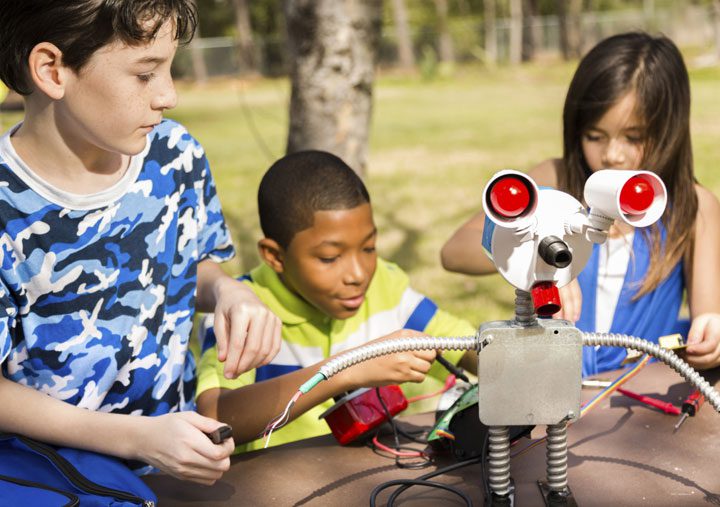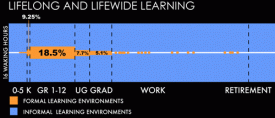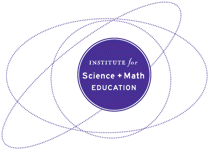What is the role of informal science education in supporting the vision for K-12 science education?

- Teachers should make educational plans that intentionally make use of out-of-school learning experiences in support of STEM learning goals.
- District staff & PD providers should help teachers learn about specific outof- school learning experiences (e.g., hobbies, programs) that support STEM learning goals—and build their capacity to take advantage of those experiences.
- School leaders should be supportive of and allocate resources so students can engage in powerful STEM learning experiences beyond the school walls.
What is the Issue?
There can be a mistaken impression that the new vision for K-12 science education is only relevant to classroom science instruction. But youth frequently engage in powerful science and engineering activities that take place after or outside-of-school. They learn STEM content, engage in STEM practices, and develop an understanding of how STEM is used in the world. To capitalize on those assets, educators and other stakeholders should learn about, leverage, and broker connections for youth across the STEM learning experiences available in and out of school.
Authors:
BY PHILIP BELL & BRONWYN BEVAN
Reflection Questions
- How can teachers partner with community organizations in order to support life-wide learning of youth (see below)?
- How do you encourage instruction that intentionally leverages students' STEM learning experiences outside of school? Is afterschool and summer STEM programming part of your plan?
- Do you build teacher's capacity to make deep use of the out-ofschool STEM learning?
Things to Consider
- Important science learning regularly happens in non-school settings. Youth often learn about science and engineering as part of their personal pursuits (e.g., during hobbies, family practices, community events). They can also learn science when they visit informal science ed institutions (e.g., museums, aquaria, zoos, etc.), go online, and attend afterschool and summer science programs.
- Many science learning goals are shared across formal and informal science education. It is mistaken to think that informal science learning does not relate to formal science learning. Some settings support specific aspects of learning more than others. Informal experiences are often more interest-driven and connect to community activities. Classroom experiences are often carefully designed, extended investigations. The range of learning settings or landscapes can be thought of as an "ecosystem" for STEM learning.
- Learning can be connected for youth across the settings of school, home, and community organizations. Most ambitious learning is accomplished across settings. Schools and community partners should identify shared goals, tools, and complementary educational opportunities that support connected learning for youth.

"Life-wide learning refers to the learning that takes place as people routinely circulate across a range of social settings and activities—classrooms, afterschool programs, informal educational institutions, online venues, homes, and other community locales. Learning derives, in both opportunistic and patterned ways, from this breadth of human experience and the related supports and occasions for learning that are available to an individual or group."
Attending to Equity
- Out-of-school programs can uniquely support the learning of youth from non-dominant communities and broaden "what counts" as STEM. Home and school science can be at odds for youth of color and those from high-poverty communities. These youth benefit from out-of-school programs where they engage in disciplinary practices. It can help them identify with science.
- Youth from non-dominant communities benefit from efforts to connect their learning across settings. When connections are made, youth can deepen their growing interest and expertise, and develop important relationships that support their learning.
Recommended Actions You Can Take
- Engage schools and community organizations in mutually—beneficial partnerships. Community partners can be organizations that provide afterschool or summer STEM programming. Higher education and STEM industries can be productive partners. Use the language of the NRC Framework and NGSS to identify and coordinate complementary educational experiences for youth.
- Work Toward a STEM Learning Ecosystem. After learning about the case studies and principles, build partnerships based on the online and local learning experiences that are related to your STEM goals.
ALSO SEE STEM TEACHING TOOLS
STEM Teaching Tools content copyright 2014-22 UW Institute for Science + Math Education. All rights reserved.
This site is primarily funded by the National Science Foundation (NSF) through Award #1920249 (previously through Awards #1238253 and #1854059). Opinions expressed are not those of any funding agency.
Work is licensed under a Creative Commons Attribution-ShareAlike 4.0 Unported License. Others may adapt with attribution. Funded by the National Science Foundation (NSF). Opinions expressed are not those of any funding agency.


 Email Feedback
Email Feedback


